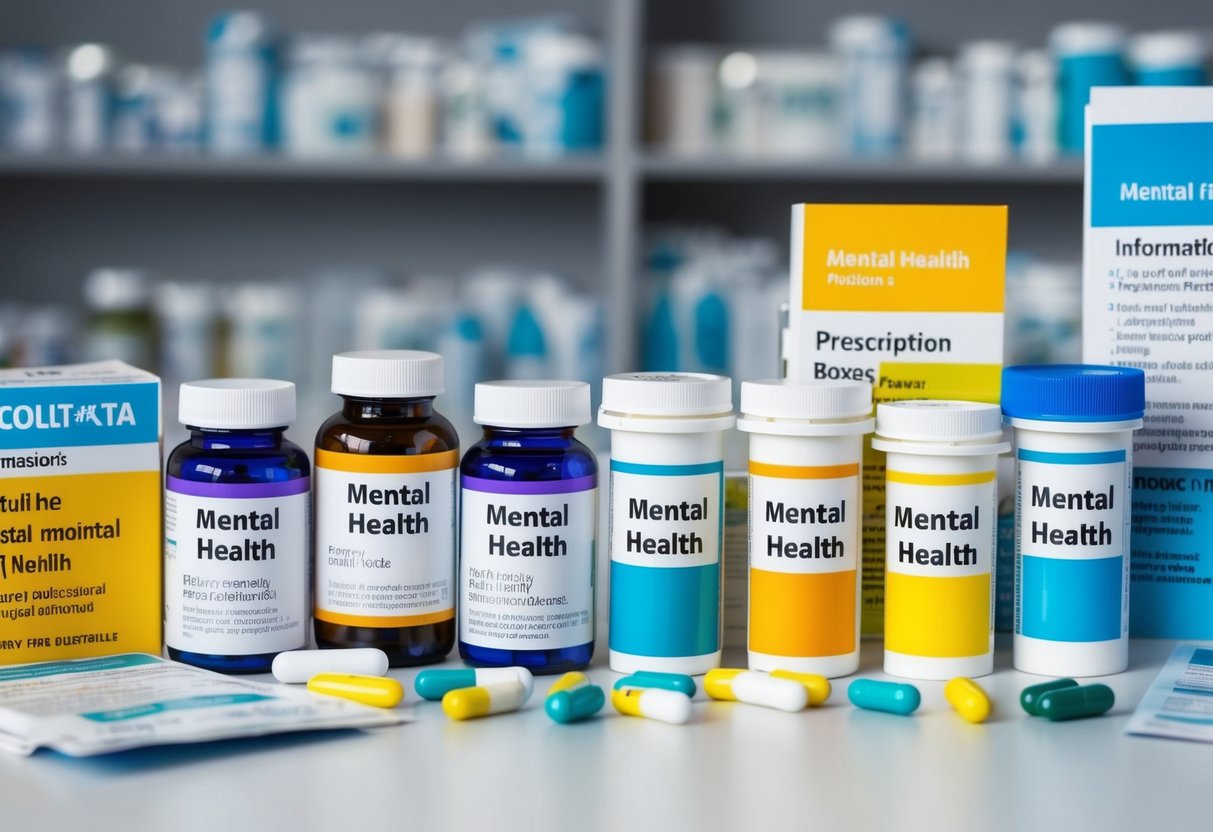Mental Health Medications: What You Need to Know
Navigating the world of mental health can be overwhelming, especially when it comes to medications. This process often involves understanding various treatment options and their potential impacts. Mental health medications play a crucial role in managing symptoms of conditions like depression, anxiety, bipolar disorder, and schizophrenia. They can help regulate brain chemicals and improve overall well-being when used effectively.

Each person’s experience with mental health medication can be unique. Finding the right medication, or combination of medications, may require some trial and error. Consulting with healthcare providers can offer tailored strategies that suit individual needs. Medications are often more effective when combined with other treatments, such as psychotherapy or lifestyle changes.
For those exploring medication options, the journey can be filled with questions about side effects, long-term use, and effectiveness. This article aims to shed light on important considerations for mental health medications. Readers will find practical insights and guidance for making informed decisions regarding their treatment paths.
Key Takeaways
- Mental health medications help manage symptoms of various conditions.
- Finding the right medication may take time and professional advice.
- Medications are often part of a comprehensive treatment plan.
Understanding Mental Health Medications
Mental health medications are essential for managing different mental health conditions. They come in various types and work by affecting brain chemistry to improve symptoms. There are some misunderstandings about how these medications function.
Types of Medications
There are several major categories of medications used in mental health treatment. Antipsychotics are often prescribed for conditions like schizophrenia and bipolar disorder. Antidepressants are commonly used for depression and anxiety disorders. Mood stabilizers help those with mood swings, particularly in bipolar disorder. Anxiolytics reduce anxiety and can also serve as sleep aids. Finally, stimulants are frequently used for attention deficit hyperactivity disorder (ADHD).
Each type of medication has different mechanisms of action and potential side effects. It is important to work closely with a healthcare provider to find the most suitable option.
How Medications Help
Psychiatric medications assist by balancing chemicals in the brain, which can improve mood, thought patterns, and behavior. They do not cure mental health disorders but can significantly reduce symptoms and improve functioning.
For many, medication is most effective when combined with other treatments. This might include psychotherapy or lifestyle changes. Medications can provide stability, making other therapeutic approaches more successful. Finding the right medication may take time and adjustments to dosage or type, as individuals may respond differently.
Common Misconceptions
There are several misconceptions about mental health medications. Some people worry that medications will alter their personality or make them less themselves. In reality, most medications are designed to help individuals regain control over their lives and improve their quality of life.
Another misconception is that once someone starts taking these medications, they’ll need them forever. This isn’t always true, as some people use them temporarily, depending on their condition. Also, some fear side effects, though many people experience manageable side effects, which can often be minimized by adjusting dosages.
Factors Influencing Treatment
Effective treatment of mental health conditions depends on several factors. Choosing the right medication plays a crucial role, as does managing side effects and making adjustments based on patient response. Understanding these elements can help in achieving successful outcomes.
Determining the Right Medication
Selecting the right medication for mental health conditions like schizophrenia, bipolar disorder, or major depression is a complex task. It involves considering the patient’s symptoms, history, and any other medications they are taking. Doctors often start with medications that have a proven track record, aiming for the best balance between efficacy and safety.
Some medications may require trying several options before finding the most effective one. A mental health professional will often use assessment tools and patient feedback to guide this process. Additionally, patient adherence significantly impacts the success of the chosen medication, emphasizing the need for collaboration between the patient and healthcare provider.
Consideration of Side Effects
Side effects are a common concern when it comes to mental health medications. They can include anything from mild issues like dry mouth and fatigue to more serious ones such as weight gain or changes in mood. The patient and doctor must weigh these side effects against the benefits of the medication.
Doctors monitor patients closely when they begin a new medication, especially for the first few weeks. Adjustments may be necessary if side effects are too severe. Some side effects may lessen over time, which is an important aspect to discuss with the healthcare provider. NIMH notes that finding the right balance can often take several attempts.
Medication Management and Adjustment
Consistent medication management is critical to treatment success. This includes taking medications at the prescribed times, ensuring the correct dosages, and not skipping doses. Doctors might adjust dosages based on how the patient responds over time or if any changes in symptoms occur.
Patients must communicate openly with healthcare providers about any changes in their condition or side effects. Psychological factors like the patient’s beliefs about medicine can also play a role. This dialogue helps healthcare providers optimize treatment plans, making adjustments as necessary for the best outcomes. Regular follow-ups can further enhance medication management.
Navigating Treatment Options
Navigating mental health treatment involves understanding the role of healthcare professionals, considering lifestyle and support systems, and tracking progress. These elements work together to create a tailored treatment plan.
Working with Healthcare Professionals
Healthcare professionals are essential in guiding individuals through mental health treatment options. They assess symptoms, provide diagnoses, and suggest appropriate treatments. It’s important to find a professional who listens and involves the patient in decision-making. This patient-centered approach fosters collaboration and trust.
During consultations, patients should communicate their symptoms clearly. Asking questions about treatment goals, options, and potential side effects helps in understanding the process better. Regular follow-ups ensure that the treatment plan stays effective and adjustments can be made if necessary. Communication is key to a successful partnership with healthcare professionals.
Lifestyle Considerations and Support
Treatment success often depends on integrating lifestyle changes. A balanced diet, regular exercise, and adequate sleep can positively impact mental health. These habits complement traditional treatments like medication or therapy.
Support systems, such as family and friends, play a critical role. They provide emotional backing and may assist in managing daily activities or attending appointments. Some people also benefit from support groups where they can share experiences and learn from others facing similar challenges.
Making small, manageable lifestyle changes can enhance treatment outcomes. Patients should consider what supports are available to them and leverage these resources for better results.
Monitoring Progress and Outcomes
Monitoring progress is crucial for evaluating the effectiveness of treatment. This involves keeping track of symptom changes, medication effects, and overall well-being. Patients can maintain a journal or use apps designed for tracking mental health.
Regular updates with healthcare professionals help assess progress. Adjustments to medication or therapy might be necessary over time. Being proactive about monitoring ensures that any issues are addressed promptly.
Setting realistic goals and checking them periodically can also help measure success. Feedback from these evaluations provides a clearer picture of what’s working and what needs change, leading to more effective treatment plans.
Frequently Asked Questions
Mental health medications come in different types, each serving specific functions. These drugs offer various benefits but also have potential long-term effects. Knowing how they work and how to manage discontinuation is crucial.
What are the common types of medications prescribed for mental health issues?
Several types of medications are commonly prescribed for mental health issues. Antidepressants, like SSRIs, are used for depression and anxiety. Antipsychotics help with conditions like schizophrenia. Mood stabilizers treat bipolar disorder. Each type targets different symptoms and imbalances in the brain to improve mental health conditions.
What benefits can be expected from taking medication for mental illnesses?
Medications for mental illnesses provide various benefits, such as reducing symptoms like sadness, anxiety, or mania. They can help stabilize mood, increase daily functioning, and improve overall quality of life. These medications can enable people to carry out daily activities more effectively and engage in therapy more successfully.
How do mental health medications function to alleviate symptoms?
Mental health medications function by affecting neurotransmitters in the brain. For example, antidepressants, such as SSRIs, increase serotonin levels to improve mood and reduce anxiety. Antipsychotics adjust dopamine levels, which can help manage delusions or hallucinations. Each class of medication works differently to address specific symptoms and conditions.
Can you outline the long-term effects of using psychiatric drugs?
Long-term effects of using psychiatric drugs vary depending on the medication type and individual. Some possible effects include weight changes, sleep disturbances, and metabolic issues. It’s important to monitor these effects with a healthcare provider, who can adjust treatment plans as needed to minimize adverse impacts while maximizing benefits.
How should one manage discontinuing psychiatric medication safely?
Discontinuing psychiatric medication should be done under the guidance of a healthcare provider. Gradual reduction, or tapering, is often recommended to minimize withdrawal symptoms. It’s crucial to discuss any concerns with a doctor, as abrupt discontinuation can lead to relapse or worsening of symptoms. A personalized plan is essential for safe discontinuation.
Conclusion
Medications are important in managing mental health disorders and are often used alongside therapies like psychotherapy. They help reduce symptoms, improve quality of life, and support other treatments. Common types include antidepressants, antipsychotics, mood stabilizers, and stimulants. Finding the right medication is a balancing act due to potential side effects. Open communication with healthcare providers is key for adjusting treatments and achieving better outcomes. Ongoing research continues to improve mental health care options.









